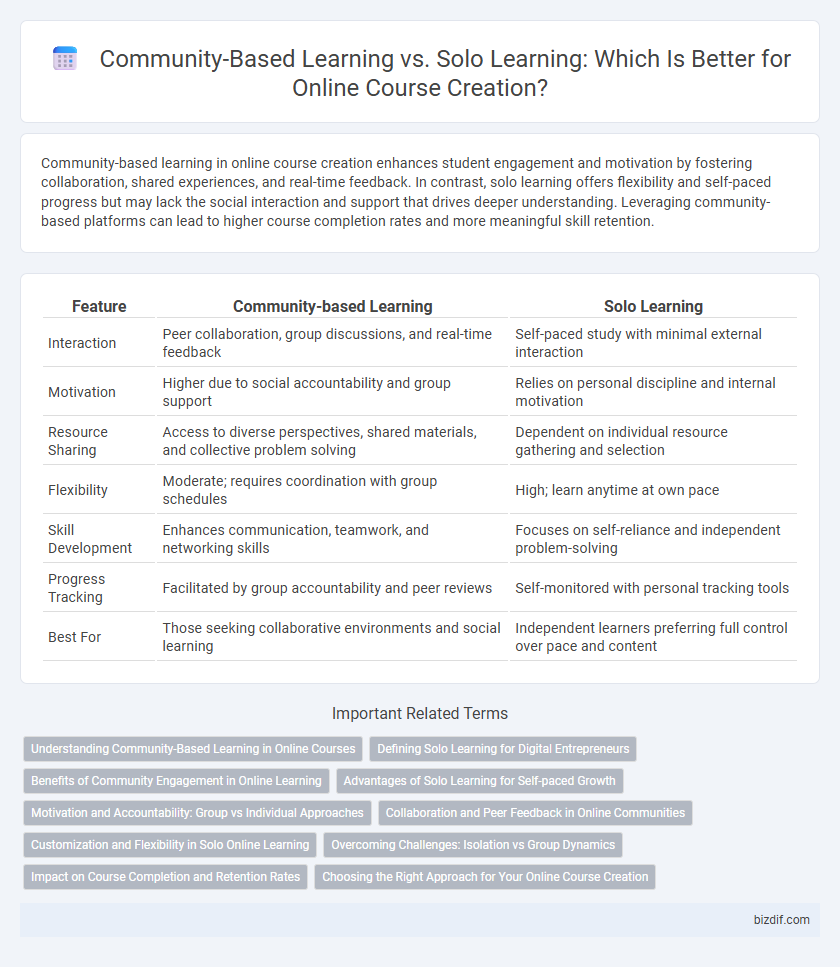Community-based learning in online course creation enhances student engagement and motivation by fostering collaboration, shared experiences, and real-time feedback. In contrast, solo learning offers flexibility and self-paced progress but may lack the social interaction and support that drives deeper understanding. Leveraging community-based platforms can lead to higher course completion rates and more meaningful skill retention.
Table of Comparison
| Feature | Community-based Learning | Solo Learning |
|---|---|---|
| Interaction | Peer collaboration, group discussions, and real-time feedback | Self-paced study with minimal external interaction |
| Motivation | Higher due to social accountability and group support | Relies on personal discipline and internal motivation |
| Resource Sharing | Access to diverse perspectives, shared materials, and collective problem solving | Dependent on individual resource gathering and selection |
| Flexibility | Moderate; requires coordination with group schedules | High; learn anytime at own pace |
| Skill Development | Enhances communication, teamwork, and networking skills | Focuses on self-reliance and independent problem-solving |
| Progress Tracking | Facilitated by group accountability and peer reviews | Self-monitored with personal tracking tools |
| Best For | Those seeking collaborative environments and social learning | Independent learners preferring full control over pace and content |
Understanding Community-Based Learning in Online Courses
Community-based learning in online courses fosters interactive engagement, collaborative problem-solving, and shared knowledge construction, enhancing retention and application of concepts. This approach leverages digital forums, peer feedback, and group projects, creating a dynamic learning environment that contrasts with solo learning's isolated study methods. Research indicates community-based learning increases motivation and improves critical thinking skills compared to solitary online learning approaches.
Defining Solo Learning for Digital Entrepreneurs
Solo learning for digital entrepreneurs involves independently acquiring skills and knowledge through self-paced online courses, tutorials, and digital resources without direct peer interaction. This method allows personalized focus on specific business needs and flexible scheduling, ideal for entrepreneurs seeking autonomy and tailored skill development. Emphasizing self-discipline and intrinsic motivation, solo learning supports entrepreneurs in mastering tools like digital marketing, e-commerce platforms, and content creation at their own pace.
Benefits of Community Engagement in Online Learning
Community-based learning in online courses fosters collaboration, enhancing problem-solving skills through peer interaction and shared resources. Engagement with diverse perspectives promotes deeper understanding and retention of material compared to solo learning. Active participation in forums and group projects boosts motivation, accountability, and learner satisfaction, driving better course completion rates.
Advantages of Solo Learning for Self-paced Growth
Solo learning offers unparalleled flexibility, allowing individuals to tailor their study schedules to personal commitments and peak productivity times. It fosters deep focus and self-discipline, enabling learners to absorb material at their own pace without external disruptions. This method supports personalized content engagement, leading to more efficient knowledge retention and skill mastery in online course environments.
Motivation and Accountability: Group vs Individual Approaches
Community-based learning fosters motivation through peer interaction and shared goals, enhancing accountability as learners feel responsible to the group. Solo learning relies on self-discipline and intrinsic motivation, which can be challenging without external accountability structures. Online courses that integrate group activities often see higher completion rates due to the social support and collaborative environment boosting learner engagement.
Collaboration and Peer Feedback in Online Communities
Community-based learning in online courses fosters collaboration through discussion forums, group projects, and real-time interactions, enhancing critical thinking and problem-solving skills. Peer feedback within these communities provides diverse perspectives, encouraging continuous improvement and deeper content understanding. Solo learning lacks this dynamic exchange, often resulting in limited motivation and slower skill development compared to community-driven environments.
Customization and Flexibility in Solo Online Learning
Solo online learning offers unparalleled customization, allowing learners to tailor their pace, content, and schedule to fit individual needs. Unlike community-based learning, it provides flexibility to revisit materials anytime, fostering deep personal reflection and mastery. This personalized approach enhances skill acquisition by adapting to unique learning styles and goals.
Overcoming Challenges: Isolation vs Group Dynamics
Community-based learning minimizes isolation by fostering peer interaction and collaborative problem-solving, which enhances motivation and accountability. Solo learning offers flexibility but often faces challenges like lack of feedback and limited social engagement, leading to decreased persistence. Effective course design incorporates structured group activities to balance support from community dynamics with the autonomy of solo study, improving learner retention and outcomes.
Impact on Course Completion and Retention Rates
Community-based learning in online courses significantly improves completion and retention rates by fostering peer support, accountability, and collaborative engagement. Learners benefit from shared resources, real-time feedback, and social motivation, which reduce dropout rates compared to solo learning environments. Data shows that courses incorporating active community elements report up to 50% higher retention and completion rates than those relying solely on individual study.
Choosing the Right Approach for Your Online Course Creation
Community-based learning enhances online course creation by fostering collaboration, peer feedback, and diverse perspectives, which leads to deeper engagement and improved knowledge retention. Solo learning offers flexibility and personalized pacing, allowing course creators to tailor content specifically to individual needs without distractions. Selecting the right approach depends on the target audience's preferences, course objectives, and the desired level of interaction within the learning environment.
Community-based learning vs Solo learning Infographic

 bizdif.com
bizdif.com